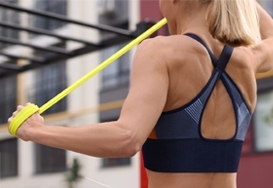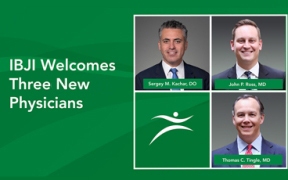Rotator cuff tears are a common (and very painful) shoulder injury that can happen to athletes and non-athletes alike.
The name “rotator cuff” makes most people imagine a single object that holds the shoulder in place. In reality, the rotator cuff is made up of multiple tendons and muscles that work together to hold the ball on the upper arm in the socket, which is created by the collarbone and shoulder blade.
This combination of tendons, muscles, and bone gives the shoulder the greatest range of motion of any joint of the human body. However, this incredible range of motion can leave the joint—and its complex anatomy—open to injury.
Keep reading to learn how rotator cuff tears occur, how they’re commonly treated, and how to prevent rotator cuff injuries from happening to you.
The Where and How of Torn Rotator Cuffs
A tear in the rotator cuff is not usually a torn muscle but a torn tendon. Tears can happen in two ways: a sudden traumatic injury or repetitive motion.
A traumatic rotator cuff injury typically occurs following a fall or lifting a heavy object. The more common repetitive-motion-type rotator cuff tears often occur in athletes who rely heavily on their shoulders, like football quarterbacks, swimmers, tennis players, and baseball pitchers.
Minimizing the Potential for Rotator Cuff Injuries
There are a few things you can do to help prevent rotator cuff tears, including:
- Take frequent breaks if you have a job that requires repeatedly moving the shoulder in the same motion.
- When participating in sports that cause repetitive arm motion, make sure to rest your shoulder as often as possible.
- Exercise the shoulder to strengthen the muscles (check with a physician before starting any exercise regimen).
- If you feel any pain in the shoulder, immediately stop what you are doing and call your orthopedic specialist.
Treatments for Rotator Cuff Tears

As with most orthopedic injuries, there are multiple shoulder pain treatments for rotator cuff tears, including:
- Rest
- Immobilization
- Corticosteroid Injections
- Rotator Cuff Surgery
The rotator cuff treatments your orthopedic doctor recommends will depend on the severity and duration of the injury. In most cases, the physician will prescribe physical therapy in conjunction with other treatments.
Self-treating rotator cuff tears and other shoulder injuries isn’t usually a good idea, so it is essential that you make an appointment with an orthopedic doctor. They will ensure that your shoulder is treated in the best way possible to get you back to doing what you enjoy.
Trust the Shoulder Experts at IBJI
The specialists at IBJI will diagnose your condition and provide optimal shoulder care, with treatments to relieve your pain and ensure you maintain a full range of motion.
For people with rotator cuff tears or those who have another type of shoulder injury that may require a second opinion, make an appointment to meet with one of our orthopedic specialists.
*This content is for information only and is not intended to replace the diagnosis, treatment, or medical advice from your treating healthcare professionals. The content does not provide medical advice, does not constitute the practice of medicine or other healthcare professional services, and does not create a doctor-patient relationship. You should not rely on this information as a substitute, nor does it replace professional medical advice, diagnosis, or treatment. If you have concerns or questions, seek the advice of your healthcare professionals. If you think you may have a medical emergency, call your doctor or 911 immediately. Do not rely on electronic communications or communicate through this website for immediate, urgent medical needs. This website is not designed to facilitate medical emergencies. The use of the information is at the reader’s own risk. The links are provided for information and convenience only. We cannot accept responsibility for the sites linked or the information found here. A link does not imply an endorsement of a site.




